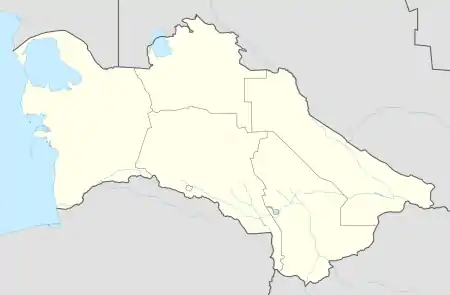| Siege of Gurganj (1221) | |||||||
|---|---|---|---|---|---|---|---|
| Part of Mongol conquest of the Khwarazmian Empire | |||||||
 A depiction of an execution following the siege | |||||||
| |||||||
| Belligerents | |||||||
| Mongol Empire | Khwarazmian Empire | ||||||
| Commanders and leaders | |||||||
| Unknown | |||||||
| Units involved | |||||||
| City garrison | ||||||
| Strength | |||||||
| Unknown | Unknown | ||||||
| Casualties and losses | |||||||
| Unknown | All | ||||||
 Gurganj Location of the siege on a map of modern Turkmenistan | |||||||
The siege of Gurganj took place during the Mongol conquest of the Khwarazmian Empire. Genghis Khan, ruler of the Mongol Empire, had launched a multi-pronged assault on the Khwarazmian Empire, ruled by Shah Muhammad II.[1] Through a combination of efficient planning and excellent manoeuvering, the Khan's army managed to take the border town of Otrar swiftly, followed by the large cities of Bukhara and Samarkand.[2]
Genghis sent a detachment, led by his sons Jochi and Chagatai, northwest to lay siege to the former capital of Gurganj. Immensely wealthy, the city lay on marshy grounds on the delta of the Amu Darya, making it difficult to assault.[3] The siege was further complicated by disagreements between the two commanding brothers.[4] Eventually, Genghis sent Ogedai, his third son and eventual heir, as sole commander for the siege.
When the city was eventually taken, it was annihilated, in one of the bloodiest massacres in human history.[5]
See also
References
- ↑ Golden, Peter (2009). "Inner Asia c.1200". The Cambridge History of Inner Asia. The Chinggisid Age: 9–25. doi:10.1017/CBO9781139056045.004. ISBN 9781139056045.
- ↑ Buniyatov, Z. M. (2015) [1986]. Государство Хорезмшахов-Ануштегинидов: 1097-1231 [A History of the Khorezmian State under the Anushteginids, 1097-1231]. Translated by Mustafayev, Shahin; Welsford, Thomas. Moscow: Nauka. ISBN 978-9943-357-21-1.
- ↑ Biran, Michal (2009). "The Mongols in Central Asia from Chinggis Khan's invasion to the rise of Temür". The Cambridge History of Inner Asia. The Chinggisid Age: 47. ISBN 9781139056045.
- ↑ Jackson, Peter (2009). "The Mongol Age in Eastern Inner Asia". The Cambridge History of Inner Asia. The Chinggisid Age: 26–45. doi:10.1017/CBO9781139056045.005. ISBN 9781139056045.
- ↑ May, Timothy (2018). The Mongol Empire. Edinburgh: Edinburgh University Press. ISBN 9780748642373. JSTOR 10.3366/j.ctv1kz4g68.11.